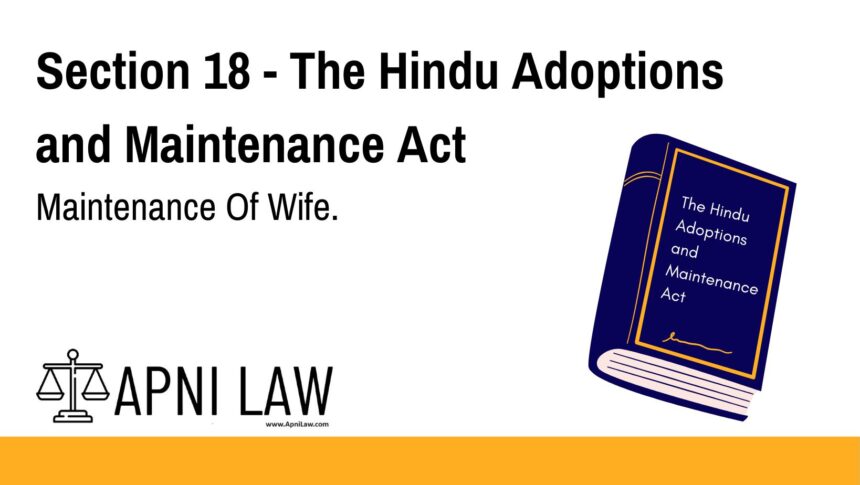Code: Section 18 of the Hindu Adoptions and Maintenance Act, 1956
(1) Subject to the provisions of this section, a Hindu wife, whether married before or after the commencement of this Act, shall be entitled to be maintained by her husband during her lifetime.
(2) A Hindu wife shall be entitled to live separately from her husband without forfeiting her claim to maintenance—
(a) if he is guilty of desertion, that is to say, of abandoning her without reasonable cause and without her consent or against her wish, or of wilfully neglecting her;
(b) if he has treated her with such cruelty as to cause a reasonable apprehension in her mind that it will be harmful or injurious to live with her husband;
(d) if he has any other wife living;
(e) if he keeps a concubine in the same house in which his wife is living or habitually resides with a concubine elsewhere;
(f) if he has ceased to be a Hindu by conversion to another religion;
(g) if there is any other cause justifying her living separately.
(3) A Hindu wife shall not be entitled to separate residence and maintenance from her husband if she is unchaste or ceases to be a Hindu by conversion to another religion.
Explanation of Section 18
Section 18 of the Hindu Adoptions and Maintenance Act, 1956 lays down the statutory rights of a Hindu wife to claim maintenance from her husband during her lifetime. This right applies regardless of whether the marriage occurred before or after the commencement of the Act.
The provision acknowledges the wife’s right to live separately from her husband in certain situations without affecting her entitlement to maintenance. These situations include cruelty, desertion, polygamy, keeping of a concubine, conversion of the husband, or any other reasonable cause.
However, this right is conditional. If the wife is found to be unchaste or converts to another religion, she forfeits her right to maintenance and separate residence.
Key Conditions Under Section 18(2):
- Desertion or neglect by the husband
- Cruelty causing reasonable apprehension of harm
- Husband has another wife
- Husband keeps or resides with a concubine
- Husband converts to another religion
- Other justified causes for living separately
Disqualification under Section 18(3):
- Wife is unchaste
- Wife converts from Hinduism to another religion
Illustrations
Example 1: Maintenance Despite Living Separately
A Hindu woman leaves her husband after he becomes abusive and threatening. She continues to live separately. Under Section 18(2)(b), she is still entitled to maintenance as the separation was justified.
Example 2: Husband Living with Another Wife
A man marries another woman while still legally married to his first wife. The first wife chooses to live separately. Under Section 18(2)(d), she remains entitled to maintenance.
Example 3: Wife Converts Religion
If a Hindu wife converts to another religion (e.g., Christianity or Islam), she loses her right to maintenance under Section 18(3), regardless of her husband’s behavior.
Common Questions and Answers
1. Can a wife claim maintenance if she leaves her husband?
Yes, if her reasons fall under the grounds listed in Section 18(2), such as cruelty, desertion, or the husband’s conversion or polygamy.
2. What happens if the wife is unfaithful?
Under Section 18(3), if the wife is unchaste, she is not entitled to separate residence or maintenance.
3. Is the right to maintenance limited by the date of marriage?
No. The right applies to all Hindu wives, regardless of whether the marriage took place before or after the Act came into effect.
4. Can maintenance be claimed if the husband changes his religion?
Yes. If the husband ceases to be a Hindu by converting to another religion, the wife has a legal right to live separately and claim maintenance.
5. What is the significance of “any other cause” under Section 18(2)(g)?
This clause is interpreted broadly and may include situations where continued cohabitation is unreasonable due to health issues, moral grounds, or other justifiable reasons.
Conclusion
Section 18 of the Hindu Adoptions and Maintenance Act, 1956 ensures that a Hindu wife has a legal right to maintenance and can live separately under specific conditions without forfeiting this right. The law also enforces moral and social obligations on husbands, while preventing misuse by setting clear exceptions in cases of unchastity or religious conversion.
To learn more about your rights under Hindu personal laws or for legal assistance, visit ApniLaw.








